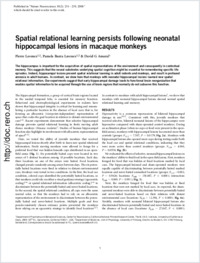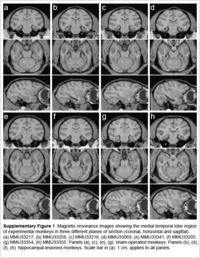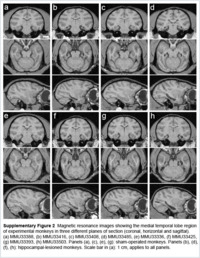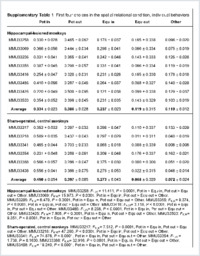Spatial relational learning persists following neonatal hippocampal lesions in macaque monkeys
- Lavenex, Pierre Department of Psychiatry and Behavioral Sciences, Center for Neuroscience, California National Primate Research Center, The M.I.N.D. Institute, University of California at Davis, Sacramento, California, USA - Department of Medicine, Unit of Physiology, University of Fribourg, Switzerland
- Lavenex, Pamela Banta Department of Psychiatry and Behavioral Sciences, Center for Neuroscience, California National Primate Research Center, The M.I.N.D. Institute, University of California at Davis, Sacramento, California, USA - Department of Medicine, Unit of Physiology, University of Fribourg, Switzerland
- Amaral, David G. Department of Psychiatry and Behavioral Sciences, Center for Neuroscience, California National Primate Research Center, The M.I.N.D. Institute, University of California at Davis, Sacramento, California, USA
-
31.12.2006
Published in:
- Nature Neuroscience. - 2006, vol. 10, no. 2, p. 234 - 239
English
The hippocampus is important for the acquisition of spatial representations of the environment and consequently in contextual memory. This suggests that the neural substrates underlying spatial cognition might be essential for remembering specific life episodes. Indeed, hippocampal lesions prevent spatial relational learning in adult rodents and monkeys, and result in profound amnesia in adult humans. In contrast, we show here that monkeys with neonatal hippocampal lesions learned new spatial relational information. Our experiments suggest that early hippocampal damage leads to functional brain reorganization that enables spatial information to be acquired through the use of brain regions that normally do not subserve this function.
- Faculty
- Faculté des sciences et de médecine
- Department
- Département de Médecine
- Language
-
- English
- Classification
- Medicine
- License
-
License undefined
- Identifiers
-
- RERO DOC 6374
- DOI 10.1038/nn1820
- Persistent URL
- https://folia.unifr.ch/unifr/documents/300332
Other files
Statistics
Document views: 108
File downloads:
- pdf: 255
- Additional material (Fig. 1): 136
- Additional material (Fig. 2): 128
- Additional material (Table 1): 112



